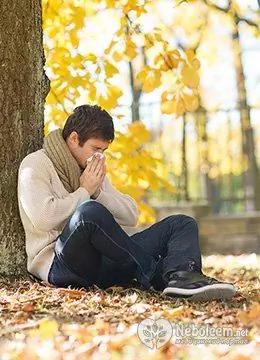- Author Rachel Wainwright wainwright@abchealthonline.com.
- Public 2023-12-15 07:39.
- Last modified 2025-11-02 20:14.
Allergic rhinitis

One of the manifestations of a paradoxical immune response is allergic rhinitis, otherwise it is called seasonal. The disease is also referred to as hay fever, because signs of health problems appear when they come into contact not only with pollen, but also with dried grass. The first contact with the allergen occurs at the level of the upper respiratory tract, in the cells of the nasal mucosa. Due to the specific reaction of the organism, which is of a genetic nature, antibodies are synthesized to certain substances of an organic nature - immunoglobulins of group E. They bind foreign particles, forming complexes: antigen-antibody. Upon repeated contact with foreign particles, a violent reaction occurs. Since immune complexes are deposited in the cells of the nose, in the first place, with such a reaction, allergic rhinitis develops with all its manifestations.
Allergic rhinitis, development mechanism
With constant contact with allergens, the state of a chronic inflammatory process in the nasal cavity provokes exacerbations throughout the year. When allergic rhinitis is only seasonal in nature, exacerbations "disappear" after the end of the flowering period of certain plants. Most often, the source of this condition is not pollen, but birch trees during the period when the leaves are blooming.
Most often, allergic rhinitis develops in spring and autumn - this is due to another common allergen - microfungi, which move freely through the air.
Nonspecific stimuli - triggers provoke bouts of sneezing, runny nose and other symptoms of allergic rhinitis. In terms of chemical composition, they have nothing to do with allergens, but irritate the receptors of the nasal mucosa. In a state of hypersensitivity of the nervous system, the immune response follows immediately. The following factors can serve as triggers for allergic rhinitis:
- Tobacco smoke, regardless of the brand of cigarettes;
- Exhaust gases from motor vehicles;
- Cold air when moving from a warm room;
- Pungent smell of perfumery or household chemicals.
The nasal cavity, paranasal resonant sinuses of the facial skull and the tracheobronchial tree form a single anatomical and physiological system. All these organs are lined with the same epithelial cover. Therefore, allergic rhinitis is often accompanied by the following diseases:
- Polypoid rhinosinusitis;
- Asthmatic bronchitis;
- Bronchial asthma.
If allergic rhinitis is not treated in a timely manner, similar conditions develop. Moreover, not as concomitant diseases or complications, but indicate the prevalence of the inflammatory process.
Allergic rhinitis, symptoms
The clinical picture of the disease allergic rhinitis symptoms are as follows:
- Basic;
- Additional;
- Non-specific.
The main manifestations include:
- Watery nasal discharge;
- Paroxysmal sneezing for no apparent reason, mostly in the morning;
- Burning sensation in the nose, itching that spreads throughout the nasopharynx;
- Breathing through the mouth due to nasal congestion, snoring, puffing, decreased sense of smell, nasal sound.
Allergic rhinitis has a characteristic feature: "allergic salute". The child runs his palm upward along the tip of the nose, fighting the itching. As a result of this movement, scratches and scratches appear on the nose, and a transverse nasal fold is formed.
Additional manifestations of allergic rhinitis do not occur in all patients, but they occur in most cases. These are the following symptoms:
- Lachrymation, photophobia, the appearance of dark circles under the eyes;
- Cracking sensation in the ears when swallowing, hearing impairment;
- Sore throat;
- Nosebleeds due to mechanical irritation of the mucous membrane;
- Skin irritation of the wings of the nose and nasolabial triangle.
The general symptoms of allergic rhinitis are nonspecific, but they constantly accompany the disease:
- Irritability, lethargy;
- Loss of appetite combined with nausea;
- Headache;
- Insomnia.
Much less often, allergic rhinitis is accompanied by an increase in body temperature. This occurs when bacteria multiply at the site of epithelial lesions. Children show signs of indigestion due to the swallowing of copious contents from the nasopharynx.
Allergic rhinitis, remedies for treatment
The main goal of allergic rhinitis treatment is to prevent the development of bronchial asthma. To do this, it is necessary to establish control over the symptoms, as well as level all associated diseases.
Allergic rhinitis should be treated according to a clear program, which includes the following measures:
- Elimination of contact with the allergen;
- Anti-inflammatory therapy;
- Symptomatic therapy;
- Hypoallergenic diet;
- Immune therapy.

In cases where the identification of allergic factors is difficult, it is necessary for the patient to create an environment close to sterility. Frequent cleaning of the room, conditioned, humidified air helps to eliminate the reasons why allergic rhinitis develops, while household chemicals should be chosen with great care. It is better to use plain water.
Anti-inflammatory treatment of allergic rhinitis is carried out with hormonal drugs - glucocorticoids.
For the relief of symptoms, antihistamines of the latest generation are recommended, since they do not have side effects that depress the central nervous system.
With perennial allergic rhinitis, food changes only when the disease is combined with food allergies. With the seasonal manifestation of the disease, plant products that have an affinity for allergens are excluded from the diet.
Immune therapy is carried out according to the indications of an allergist.
YouTube video related to the article:
The information is generalized and provided for informational purposes only. At the first sign of illness, see your doctor. Self-medication is hazardous to health!






